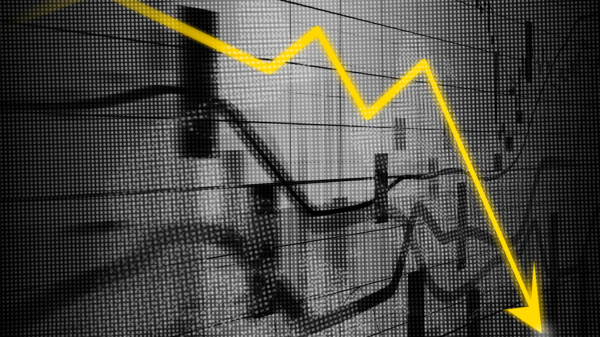Life, Liberty, Property #63: The road to economic ruin we’re on, with the U.S. economy being propped up by massive federal government deficit spending. (Analysis)
by S.T. Karnick
IN THIS ISSUE:
- The Road to Economic Ruin
- SCOTUS Upholds First Amendment
- Yes, We Have Gone Bananas
- A Libertarian for Trump
- Cartoon
SUBSCRIBE to Life, Liberty & Property (it’s free). Read previous issues.
 The Road to Economic Ruin
The Road to Economic Ruin
After hitting record highs, the stock markets drifted down much of last week, indicating that prospects for the U.S. economy are not looking as rosy as many investors thought just a few days earlier. Here are three screenshots from The Wall Street Journal showing the decline on Wednesday and Thursday:
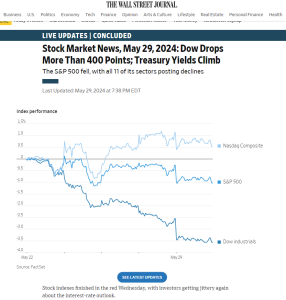
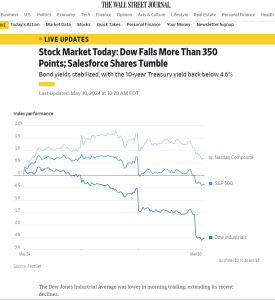
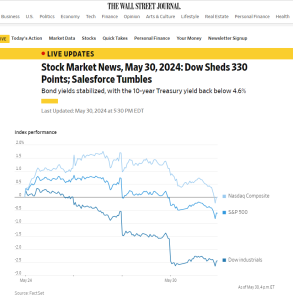
The declines initially continued on Friday, with the S&P 500 and Nasdaq falling by 0.5 percent and 1.3 percent, respectively, by midday. The Dow rose by 575 points by the end of the day, however, after a midmorning report showed inflation remained steady in April, at 2.7 percent. That news lends support to investors’ hopes that the Federal Reserve will lower interest rates sometime this year. All three indices posted gains in the month of May overall.
As I indicated two weeks ago in this newsletter, the U.S. economy is being propped up by massive deficit spending by the federal government and is anything but healthy. With the deficit spending having brought on a painful bout of price inflation, the Federal Reserve (Fed) raised interest rates and sold securities from its portfolio, to tighten the money supply. The central bank thus succeeded in creating the greatest tightening of the money supply since 1933.
The economy has not contracted in response, so the Fed has kept interest rates high and continued to sell securities.
That is no longer working to cut the money supply, however, as economist Robert Genetski notes at Heartland Daily News:
For the first time in more than a year, our measure of the monetary base did not decline in April. Although the Fed sold $95 billion in securities to tighten money, banks offset the impact by shifting $121 billion from their deposits at the Fed and putting the funds into the economy. This resulted in a net increase of $26 billion in the raw money supply, negating the Fed’s tightening.
As Genetski notes, the money supply is no longer contracting, as it did from late 2022 until the past couple of months. However, it is not rising enough to foster necessary private-sector capital expansion, as Texas Tech economics professor Alexander William Salter notes:
M2 is currently rising at 0.83 percent per year. However, an increasing money supply does not necessarily mean loose money. That’s only true if the money supply is growing faster than money demand. We usually assume, at minimum, that money demand grows as fast as overall economic activity, measured by real GDP. In the first quarter of 2024, the US economy expanded at a rate of 1.6 percent per year. That’s hardly an impressive growth rate, but it’s significantly faster than money supply growth. Money looks somewhat tight, albeit not as tight as in recent months.
In addition, the Fed may have caught itself in a public-relations policy-effect trap, its regular announcements having locked it into a situation where it cannot lower interest rates without setting off another round of inflation. Apollo Academy Chief Economist Torsten Sløk calls this the Fed Cut Reflexivity Paradox: “The more the Fed insists that the next move in interest rates is a cut, the more financial conditions will ease, making it more difficult for the Fed to cut,” Sløk writes.
Sløk illustrates the recent easing of financial conditions with the following graph:
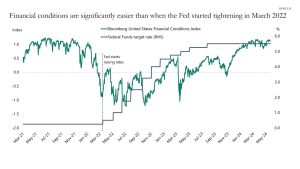
With this financial easing, money has been flowing rapidly into the stock markets in anticipation of lower interest rates, Sløk notes:
Since the Fed pivot in November 2023, when the FOMC started talking about cuts instead of hikes, the S&P 500 market cap is up $9 trillion. For comparison, consumer spending in 2023 was $19 trillion. In other words, in a few months, the household sector has experienced a windfall gain corresponding to about 50% of last year’s consumer spending!
In addition to that Fed-publicity windfall, massive hikes in federal spending have given further encouragement to business investment and consumer spending:
Combined with continued easy fiscal policy via the Chips Act, the Inflation Reduction Act, and the Infrastructure Act, it is not surprising that employment growth and inflation have been reaccelerating in 2024.
In short, why is the economy still so strong? Because fiscal policy is still a significant tailwind to the economy, and easy financial conditions have been offsetting Fed hikes.
And don’t forget the wealth effect of the ongoing increase in housing values I mentioned last time.
On top of all that, commodity prices are starting to rise, which is a very strong indicator of upcoming price inflation. The Committee to Unleash Prosperity reports, citing a paywalled article:
According to the website Trading Economics, the index of commodities—from corn to copper to heating oil and a good forward looking indicator on consumer prices—just hit its highest level in 13 years!
The CRB Commodity Index rose to 350 Tuesday reaching May 2011 levels, driven by heightened geopolitical tensions in the middle east and crude oil supply constraints from OPEC+ production cuts. Additionally, demand for gold, copper and silver is rising, while supply is tightening.
Economists anticipate a “super bull” phase for commodities and that will keep its prices elevated for the next 12 months. Among some of the index components, gold was up by 15% year-to-date, silver by 36%, crude oil by 10% and wheat by 16% YTD.
Put this all together and it’s clear that federal overspending since the beginning of 2021 spurred a spike in price inflation, accompanied by an asset bubble which is still expanding, with more price inflation probably on the way. The only path out of this thicket is the one thing that neither Congress nor the Biden administration will consider doing: cut spending, and sharply.
As Adam Smith noted, “there is a great deal of ruin in a nation,” meaning that it takes an astounding amount of damage to destroy a country. The United States began the 2020s with the world’s biggest economy, more resistant to ruin than any other. Four years later, it appears that our foolish government is testing just how much ruin this nation and its economy can stand.
Sources: American Institute for Economic Research; Heartland Daily News; Apollo Academy; Committee to Unleash Prosperity
 SCOTUS Upholds First Amendment
SCOTUS Upholds First Amendment
In an important decision that is likely to have wider implications, the U.S. Supreme Court unanimously ruled that then-New York Department of Financial Services Superintendent Maria Vullo “violated the First Amendment by coercing regulated entities to terminate their business relationships with the [National Rifle Association] in order to punish or suppress gun-promotion advocacy” in 2018 in a meeting with senior executives of the Lloyd’s of London insurance company.
The 9-0 decision written by Justice Sonia Sotomayor made a clear distinction between persuasion and coercion by government officials: “While a government official can share her views freely and criticize particular beliefs in the hopes of persuading others, she may not use the power of her office to punish or suppress disfavored expression,” and “a government official cannot directly or indirectly coerce a private party to punish or suppress disfavored speech on her behalf,” the Court ruled.
Threatening to punish or aid people based on cooperation with the government is forbidden, the Court affirmed. “The message was loud and clear: Lloyd’s ‘could avoid liability for [unrelated] infractions’ if it ‘aided DFS’s campaign against gun groups’ by terminating its business relationships with them” (brackets in original), Sotomayor wrote in the Court’s unanimous decision in National Rifle Association of America v. Vullo, released on Thursday.
Citing the Court’s decision in Bantam Books, Inc. v. Sullivan (1963), Sotomayor notes that “a government official cannot do indirectly what she is barred from doing directly: A government official cannot coerce a private party to punish or suppress disfavored speech on her behalf.”
“As the reaction from Lloyd’s further confirms, Vullo’s alleged communications—whether seen as a threat or as an inducement—were reasonably understood as coercive,” Sotomayor wrote for the Court.
This ruling may have strong implications for another case that will be decided soon. The Court heard arguments in National Rifle Association of America v. Vullo on the same day as the Biden administration offered SCOTUS its defense of communications with big social media companies intended to get them to censor content about COVID-19 and the 2020 election, in Murthy v. Missouri.
The Court’s Vullo ruling that “thinly veiled threats” and inducements “in a private meeting behind closed doors” violate the First Amendment rights of the targeted companies would seem to apply to that case as well. Government officials doing indirectly what they are barred from doing directly, by “coerc[ing] a private party to punish or suppress disfavored speech on her behalf,” is exactly what the Biden administration is accused of doing, in Murthy v. Missouri.
Source: National Rifle Association of America v. Vullo

Yes, We Have Gone Bananas
Recent events show that the United States is rapidly transforming into a banana republic while some neighboring countries are moving in the opposite direction.
The prosecution and conviction of former president Donald Trump on charges of falsifying business records, plus the multiple other cases brought against him by people aligned with the opposing political party, are unprecedented in the United States. President Joe Biden has been unable to resist indulging in mockery at his predecessor’s expense. None of this is appropriate to a nation operating under rule of law.
Some countries in North and South America that have experience with authoritarian rule are doing their best to move away from that egregious form of government. Last fall, Argentina elected to the presidency Javier Milei, a libertarian economics professor who promised radically pro-market economic reforms for his inflation-crippled country—and has delivered. Also last fall, voters in Ecuador rejected a democratic socialist candidate in favor of a center-left businessman, Daniel Noboa.
In El Salvador, President Nayib Bukele, a former businessman, initiated a crackdown on drug gangs that has reduced the country’s homicide rate from 38 per 100,000 people in 2019 to 2.4 per 100,000 in 2023—the lowest murder rate in the Americas except for Canada. Opponents characterize Bukele as authoritarian, and he calls himself “the world’s coolest dictator,” yet he won reelection in February with 83 percent of the vote.
Current left-wing leaders in Latin America are losing popularity even after moderating their views slightly away from the heavy socialist-authoritarian Hugo Chavez (Venezuela) approach of the century’s first fifteen years:
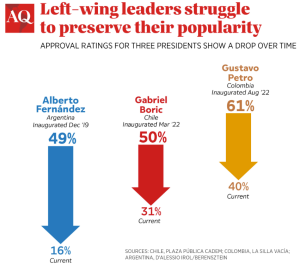
Source: Americas Quarterly
Here in the United States, by contrast, we have a national government and local prosecutors subjecting a former president and current presidential candidate to criminal trials in multiple venues on exceedingly dubious charges, the first time that has ever been done to a former U.S. president. This was clearly political, as The Wall Street Journal editorial board noted on Wednesday:
Democrats thought the Manhattan trial would hurt Mr. Trump, but so far he’s gained in the polls. Now they think a guilty verdict will take him down, and they want to gloat about it. But voters may conclude that stretching the law to turn a misdemeanor offense into a felony is more politically significant as an abuse of the justice system.
If Mr. Biden tries to exploit a conviction as a campaign theme, voters will have even more reason to believe Mr. Trump when he says the prosecution was political from the start.
Meanwhile, Democrat members of Congress, the president, a captive press, and assorted lunatics (do I repeat myself?) are interfering in the processes of the U.S. Supreme Court by relentlessly intimidating sitting Justices, even leading to assassination attempts.
The United States has increasingly been subjected to mob rule in recent years, overwhelmingly in the interests of the most radical elements within the nation’s largest political party: the Occupy movement taking over parts of cities during the Great Recession; the desecration and destruction of historical statuary and other pro-American art; mass rioting and looting ostensibly in protest against very rare instances of police brutality; an invasion of the U.S. Capitol (the participants in which are being treated abominably because of their opposition to the political regime, “as horribly as one might be treated in any third world nation,” as Patricia McCarthy notes at American Thinker); takeovers of college and university campuses by openly antisemitic and America-hating hordes; attacks on sitting jurists; and more.
Both physical and verbal abuse are being deployed on behalf of the regime to intimidate the few remaining uncooperative government officials, as columnist Auron MacInytre writes at The Blaze:
Progressives were enthusiastic about the [U.S. Supreme] court’s ability to override the will of the majority when popular opinion wasn’t on their side but now they have embraced mob rule. The left has invested heavily in the ability to manipulate mass democracy and would like to see it become the only legitimate authority. The framers of the Constitution heavily restricted the influence of democracy, ensuring that it would only directly select one half of one third of the government. Over time, however, those restrictions have fallen away. Democrats have deployed mass immigration, mass media, and mass public education to ensure that the rising tide of mass democracy worked in their favor.
Democrats are now openly attempting to remove every constitutional impediment to mob rule by attacking the disproportional representation meant to protect smaller states in institutions like the Electoral College and the Senate. Due to its domination of consensus manufacturing institutions and access to an endless stream of replacement voters through mass immigration, the left is now all-in on rule by manipulated majority.
That, too, is a hallmark of authoritarian regimes.
Now we have spent $320 million on a floating pier intended to enable the delivery of further millions of dollars of food and other aid to Palestinians in Gaza, while helping finance the Israeli government’s military intervention there, and the structure has broken free and floated away into the sea because it was designed for waters far calmer than those in which it was placed.
The inability to build a reliable floating pier is a metaphor for the stunning incompetence of our nation’s current leaders. The prosecutions of Trump and harassment of other political opponents demonstrate the leaders’ malevolence. The combination of gross ineptitude and unbounded malice toward political opponents and their supporters is a hallmark of corrupt regimes throughout the world.
We Americans used to shake our heads in wonder upon hearing about such things occurring in other nations. Now those of us who still have a moral compass shake our heads in shame at what our own country has become.
Writing at his Tell Me How This Ends Substack, commentator Chris Bray summarizes the rapid recent descent of the United States into corruption and failure:
The madness of the Trump conviction is a sign of incipient cultural death. It’s illness embodied. The same goes for the era of elevated mediocrities. … The absurd conviction of Donald Trump on a list of made-up noncrimes is a demonstration of stupidity, ineptitude, and mindless evil. The “mainstream” establishment complex is dying, as a cultural formation, and something else is coming.
Caveats: The death throes can go on for a long time, and damage everything they touch, and the dead thing may be replaced by something worse. But none of this merits anything but contempt and loathing. These people are the scum of the earth, and their time is passing. There will be some profoundly ugly days as they make their way off the stage.
While not endorsing all of Bray’s rhetoric, I agree fully with his summary of current conditions. Self-appointed elites’ quest for ever-greater power over the people of the United States has become so demented that the nation has abruptly taken on the characteristics of a banana republic. We await our Milei, hoping and praying that new leaders of decency and good sense will arrive before the nation’s institutions are irrevocably destroyed by the present regime’s ineptitude and malice.
Sources: The Wall Street Journal; Blaze Media; Tell Me How This Ends
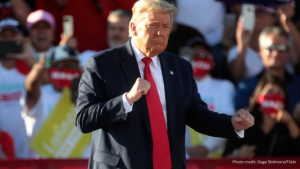
A Libertarian for Trump
The respected free-market economist Walter Block is urging his fellow libertarians to vote for Donald Trump for president this fall. Though Trump is certainly no libertarian, he is much better than the only plausible alternative, which is not the Libertarian Party nominee, Block writes: “Mr. Biden—the wokester, the socialist, the interventionist—is much further from us on the political-economic spectrum than Mr. Trump.”
Block deploys this practical approach in a very interesting way. Libertarians in states where the presidential race is not in doubt should vote their consciences as usual, Block argues, while those in swing states should help ensure that the lesser of the two evils (from a libertarian perspective) wins:
I go a step further and urge Libertarians to vote for Mr. Trump. Not all Libertarians—only those in swing states. Libertarians are too few to help him carry Massachusetts or California, so they might as well vote for Chase Oliver, our party’s nominee. And he’ll easily win Tennessee and Idaho without our help. But in Arizona, Georgia, Michigan, Nevada, Pennsylvania and Wisconsin, we could make the difference. Libertarian nominee Jo Jorgensen received roughly 50,000 votes in Arizona in 2020, when Mr. Trump lost the state by about 10,000 ballots.
If we pull the lever for Mr. Trump in these swing states, we may get a slightly more libertarian president … . If we vote Libertarian everywhere else, we make a statement and help preserve our ballot access.
As to the personal distaste many people feel toward Trump, Block has an amusing and self-deprecating insight into his fellow New Yorker:
Mr. Trump grew up in Queens. I’m roughly his contemporary and come from Brooklyn. I assure you that everyone in New York City is personally unbearable (except Staten Islanders). It is a geographical-genetic disposition. Ignore it. This act of his is mostly tongue-in-cheek. New Yorkers actually have contests to see who is the most insufferable. Prizes are given out.
That doesn’t sound anywhere near as bad as being a career politician. Block makes a great case.
Source: The Wall Street Journal
Cartoon
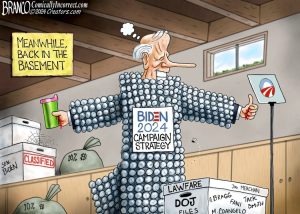
via Comically Incorrect
For more great content from Budget & Tax News. For more Rights, Justice, and Culture News.
For more from The Heartland Institute.
